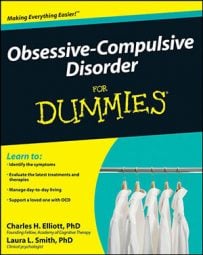If you live with OCD (obsessive-compulsive disorder), you may feel frustrated, isolated, and just plain strange. Keep the following facts in mind, or on a card to carry with you, as you go about your daily life:
OCD obsessions and compulsions do not define who you are; you are not your OCD.
Seeking reassurance when you have obsessional worries only makes things worse. Try to avoid asking other people whether everything will be okay. Instead, wait a while and see how things turn out.
Overcoming OCD requires you to work hard and accept a little discomfort. Remember that your tolerance for discomfort will increase slowly over time.
Changing compulsions in some important way (such as washing your hands differently or arranging things in a new way) helps prepare you to overcome the compulsions. When you change your compulsions, they won’t feel as satisfying, but that’s actually a good thing.
Every time you hold off a compulsion, you are taking a step toward overcoming your OCD. Even waiting just 15 or 20 minutes is an accomplishment.
Don’t forget that unpleasant feelings always lessen if you give them enough time.
Don’t try to suppress your obsessive thoughts. Just remind yourself that they are merely coming from the OCD part of your mind.
Reward yourself whenever you take a step forward — do something special, take a break from work, or eat a piece of chocolate.
OCD affects both your emotional and physical health. Many people are so consumed by their OCD that they fail to live a healthy lifestyle in other ways. The following tips can remind you to take care of yourself.
| Get regular exercise. | Join a self-help group. |
| Get enough sleep. | Have patience. |
| Eat a healthy diet. | Treat yourself with kindness and compassion. |
| Don’t isolate yourself. | Get professional help if your efforts stall. |
| Consider getting support from some friends or family. | * |

